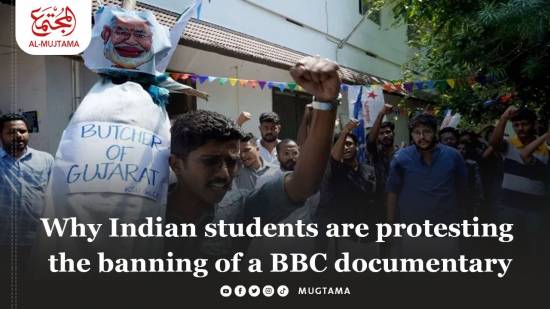Why Indian students are protesting the banning of a BBC documentary Featured
Students in India have clashed with police over the ban of a documentary about Prime Minister Narendra Modi's involvement in the 2002 anti-Muslim riots in the state of Gujarat.
Students in India have clashed with police over the government banning of a BBC documentary about Prime Minister Narendra Modi and his involvement in the 2002 anti-Muslim riots in the state of Gujarat. The documentary, “India: The Modi Question,” found the leader to be “directly responsible” for enabling the violence that led to the death of 2,000 Muslims. India’s Foreign Ministry dismissed the documentary as “propaganda” and reportedly invoked emergency powers to have it taken down online.
What is happening in India?
Hundreds of students at Jawaharlal Nehru University in New Delhi had gathered to watch a screening of the documentary organized by student president and activist Aishe Ghosh. The university had threatened disciplinary action if the screening went ahead, claiming that it would disturb the peace on campus. Before it could air, the power was cut, forcing the students to watch the documentary on their phones and laptops.
“It was obviously the administration that cut off the power,” Ghosh told Reuters. “We are encouraging campuses across the country to hold screenings as an act of resistance against this censorship.” The Students’ Federation of India (SFI) said it plans to show the documentary in every state in India.
On Wednesday, multiple students at Jamia Millia Islamia University in New Delhi were arrested after a group planned a screening. According to the SFI, the 13 students who were detained have yet to be released from police custody. The All India Student Association called for further protests and condemned the police’s “brutality.”
India currently ranks 150 out of 180 countries in the Press Freedom Index compiled by Reporters Without Borders.
Why was the documentary banned?
Last week, the BBC released the first part of the two-part series, which highlighted a British government document that said Modi was “responsible” for the riots in Gujarat when he was the state’s chief minister.
The diplomatic report featured in the documentary stated that there had been “widespread and systematic rape of Muslim women” and violence that was “politically motivated,” all of which had the “hallmarks of ... ethnic cleansing.”
The documentary was not set to air in India, and the government made it difficult for residents to access it online. After describing the documentary as a “propaganda piece designed to push a particularly discredited narrative,” the government blocked segments of it from YouTube and Twitter, implementing state censorship under the Information Technology Rules. Unnamed sources told the digital liberties nonprofit Internet Freedom Foundation that both Twitter and Google’s YouTube had complied and enforced the ban.
Arindam Bagchi, a spokesperson for the Indian government, on Thursday criticized the documentary, saying, “The bias, the lack of objectivity, and frankly a continuing colonial mindset, are blatantly visible.”
The BBC defended the documentary, saying the organization had adhered to the “highest editorial standards.”
What happened during the Gujarat riots?
How the riots in February 2002 began remains disputed. However, what is agreed on is that four cars of a train caught fire, burning 59 people, including 10 children, to death. Most of the travelers on board were Hindu pilgrims. Authorities have convicted 31 Muslims of murder over the fire. Within hours, anti-Muslim riots broke out across the state and 2,000 people lost their lives.
Modi has been accused of enabling the riots and was accused of having said that Hindus should be allowed to vent their anger. In a sworn statement in 2011, a senior police officer who worked during the riots alleged that Modi told officials that the Muslim community needed to be taught a lesson, the BBC reported.
Under the leadership of Modi, the National Democratic Alliance, led by the Hindu nationalist Bharatiya Janata Party, came into power in 2014.
In June 2021, Modi was cleared by India’s Supreme Court of any wrongdoing in the riots after a plea was filed when a special investigation team exonerated him along with 62 fellow senior government officials.
How is Elon Musk involved?
Elon Musk, as the owner of Twitter, has been blamed for Twitter’s decision to censor clips from the documentary on the app. However, Musk denied that he knew anything about the alleged censorship. Replying to a post on Twitter, he said it was the first he had heard of the matter. “It is not possible for me to fix every aspect of Twitter worldwide overnight, while still running Tesla and SpaceX, among other things,” he tweeted.
Twitter and YouTube haven't immediately replied to requests for comment.


